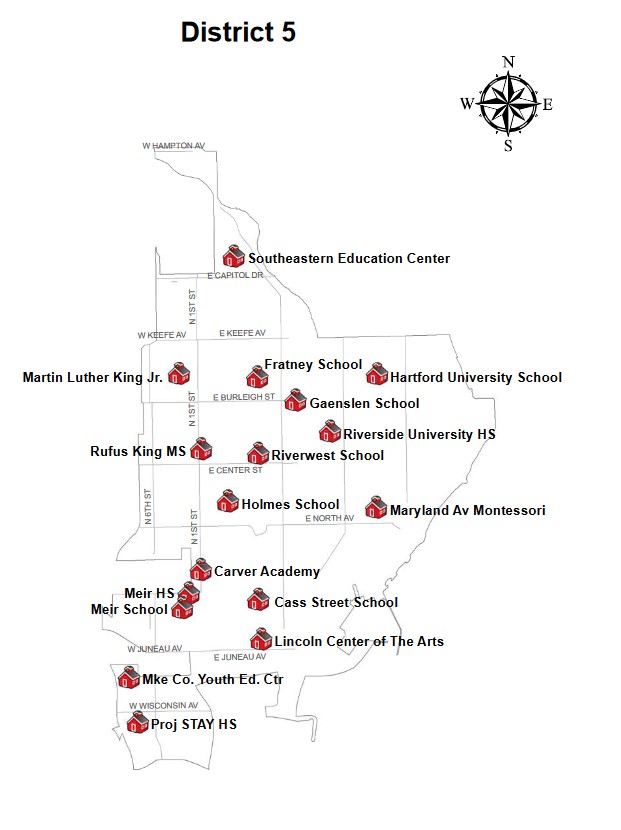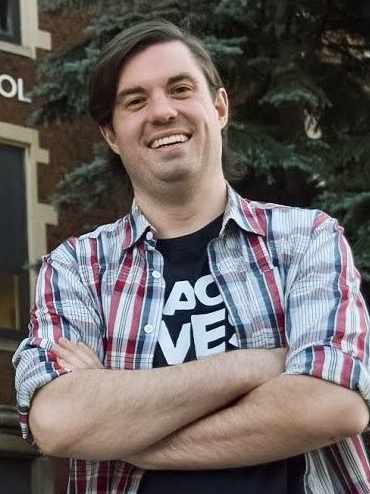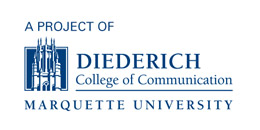
Abbie Fishman, Jilly Gokalgandhi, Kahri Phelps Okoro and Alex Brower.
 Next week voters head to the polls again – as four of the nine seats on the Milwaukee Board of School Directors are up for re-election.
Next week voters head to the polls again – as four of the nine seats on the Milwaukee Board of School Directors are up for re-election.
In District 5, which includes parts of Harambee, Riverwest, downtown and the East Side, four candidates will be on the ballot for the Feb. 16 primary. After the primary, two candidates will move on to the general election on April 6.
Early voting is open at City Hall until 5 p.m. Friday. You can find your Election Day polling place here.
Below is biographic information for candidates and answers to five questions about why they feel they are qualified and what they think about some of the school board’s current issues.
Answers have been summarized for brevity, but you can find each candidate’s full answer here: Abbie Fishman, Jilly Gokalgandhi, Kahri Phelps Okoro and Alex Brower
Abbie Fishman

(Photo provided by Abbie Fishman)
Age: 60
Address: 3335 N. Weil St.
Education: Master’s in literary studies from UW-Milwaukee; bachelor’s in English and secondary education
Occupation: Retired MPS teacher at Riverside University High School
Past elected experience: None
Endorsements: Milwaukee Teacher’s Education Association
Jilly Gokalgandhi

(Photo provided by Jilly Gokalgandhi)
Age: 29
Address: 1601 N. Jackson St., #501
Education: Bachelor’s, international affairs and economics from Marquette University
Occupation: Equity in education strategist at American Family Insurance
Past elected experience: None
Endorsements: Director Larry Miller, Director Bob Peterson, State Rep. Jonathan Brostoff, Citizen Action Wisconsin, United Auto Workers
Kahri Phelps Okoro

(Photo provided by Kahri Phelps Okoro)
Age: Did not provide
Address: 2839 N. 2nd St.
Education: MBA in international business and risk management from Concordia University; master’s in reading specialist, Concordia University; and a graduate of Milwaukee Trade and Technical H.S.
Occupation: Operations manager at Equity Supply Group/JCP Construction and a business development consultant at the African-American Chamber of Commerce of Wisconsin
Past elected experience: Milwaukee Area Technical College District Board
Endorsements: “Students, parents, and my community.”
Alex Brower

(Photo provided by Alex Brower)
Age: 33
Address: 2536 N. Palmer St.
Education: Bachelor’s in political science from Beloit College
Occupation: Executive director of the Wisconsin Alliance for Retired Americans and a substitute teacher for Milwaukee Public Schools
Past elected experience: None
Endorsements: Milwaukee Teacher’s Education Association, Milwaukee Democratic Socialists of America, Milwaukee Solidarity, Green Party of Milwaukee County, Director Marva Herndon, Director Sequanna Taylor, Director Megan O’Halloran, Director Erika Siemsen, Milwaukee County Supervisor Ryan Clancy
1. Why are you running for school board?
Fishman: “I am running for a seat on the MPS school board because I cannot sit idly by while the children in our community do not receive the education they deserve.”
Gokalgandhi: “I am a progressive, multilingual, millennial immigrant who is deeply committed to social justice. I have spent my career advocating, lobbying and fighting for public school students, educators, families and schools. I have a personal history, deeply held belief in social justice and experience in Milwaukee Public Schools.”
Okoro: “Do you realize that one out of five students can read the newspaper for comprehension? Only one out of seven students can pass the math portion of a college entrance exam or trades test. What I want is for our students to come out of MPS with a chance at earning a life-sustainable wage. We currently have over 17,300 opportunity youth- youth between the ages of 16 and 24 that are not in school and/or not working. This is unacceptable.”
Brower: “I am running for school board to bring the transformative change we need to Milwaukee’s public schools. Our public schools here in Milwaukee are under attack from privatization, systemic racism, and underfunding. As an experienced MPS educator, former union president and active community leader, I have defied the skeptics to win real gains for our community. I have the experience, vision and drive to fight for the schools that our students and community deserve.”
2. What in your background or makeup especially qualifies you for this seat?
Fishman: “My child attended and graduated from Milwaukee Public Schools as did my husband and my father. I taught in MPS for 30 years in a variety of positions. Most of that time was spent as an Advanced Placement literature & composition teacher at Riverside University High School. I served as literacy coach there and at another school also. I finished my career as an advanced academic coach traveling throughout the district supporting Advanced Placement, International Baccalaureate, and gifted and talented programs, teachers and students. My office was located at Central Office, which allowed me to observe how district business is conducted and decisions are made.”
Gokalgandhi: “I have proven experience working with our educators, students, families and community partners. My experience includes serving as the community schools coordinator at Bradley Tech High School, working in youth employment, and most recently helping grow MPS STEM programs in K-8s and high schools. I have successfully advocated for progressive policies and investments in every space I’ve worked in.”
Okoro: “As an MPS parent, educator and community advocate, I am a unique representation of over half of MPS’ student demographic. Three of my children attend MPS. I have a teacher’s lens. As a certified reading specialist, I decipher data and determine a student’s equitable course of action. I see the connection required for K-16 education and the trades. I am a businesswoman, and I serve on MATC’s District Board, which makes me familiar with proposals, budgets, projections and community expectations.”
Brower: “As president of the substitute teachers’ union, I won health care benefits for many substitute teachers by engaging in a 21-day hunger strike. We also defeated efforts to privatize our jobs to a temp agency, and I organized volunteers to knock on hundreds of doors to win a historic school funding referendum.
As an active community leader, I am the executive director of the Wisconsin Alliance for Retired Americans, a member of Citizen Action of Wisconsin’s Southeast WI Steering Committee, treasurer of the Milwaukee Democratic Socialists of America, and a leader in the movement for a Green New Deal. As an MPS substitute teacher, I built a strong reputation as a high-quality educator, teaching students across this city for over six years.”
3. What are the most important issues facing the board — and your district in particular? What do you think should be done about these issues?
Fishman: “The most glaring problem in Milwaukee Public Schools is the shortage of certified, qualified, anti-racist, invested teaching staff. I know firsthand that teaching is a stressful and challenging profession with little appreciation and inadequate compensation. Nonetheless, I cannot imagine a more rewarding career. Working with young people, hearing their naive perspectives and analysis of the world keeps a teacher young and always thinking. MPS must adjust its compensation policy so that those who make the highest salaries make a little less in order for new teachers to earn more. It is untenable that teachers have to work additional jobs just to make ends meet.”
Gokalgandhi: “The current most pressing issue that MPS faces is the COVID-19 crisis and what happens once all of our educators are vaccinated and back in the building. To be clear, schools should not reopen until community spread is controlled and vaccines are widely available. Ensuring the health and safety of our students, families, teachers and staff means we will need to provide sanitization products and personal protective equipment. Generations of underfunding for our schools have meant that MPS is dealing with old ventilation systems, lack of appropriate space for distancing and shortages in key staffing areas to support our students. We need to focus our budgets to put resources into protecting the education workers that will be with our children when they return. This includes supporting additional staffing for school social workers, school psychologists, school nurses, paraprofessionals and other staff to assist our teachers and students who have lived through a remarkable but also traumatic time in history.”
Okoro: “There are two important issues facing the board. The most spoken about is the COVID-19 pandemic. The second is the ongoing failure to close the achievement gap. For many years ,our public-school system has been failing our children, specifically Black and Hispanic children, which is over 78% of the student populations. There have been many excuses made as to why our children have been seen but not heard. Parents that had the means have moved to other districts for better educational options, leaving those without options in the district or choosing nonpublic options.”
Brower: “Housing and food insecurity, lack of access to health care, climate change and environmental racism, poverty and police violence are all social problems that show up in our classrooms as behavioral issues, achievement gaps and lack of resources and funding. The root cause of these problems is racial capitalism, with the richest among us hoarding their wealth and not paying their fair share, while the vast majority of people are forced to live paycheck to paycheck. The only way for every human being to truly realize their potential is through a new, more just form of social and economic organization: socialism.”
4. Are you satisfied with the district’s efforts to address disproportionate disciplining of Black male students as described in the Office of Civil Rights report? Would you want to change the district’s approach to this issue if elected?
Fishman: “I am not at all satisfied with the district’s efforts here. All they have done is give dispassionate lip service to a truly egregious problem. The steps MPS is taking [do] nothing to shut its tap on the school-to-prison pipeline. I believe the steps I elucidate below will result in noticeable change in MPS and our larger community:
- Change MPS discipline policies from punitive to proactive.
- Examine what rules are necessary for safety and order; enforce only those.
- Stop making every infraction a mark on a student’s record.
- Cultural responsiveness
- All adults in MPS must know, honor, and respect the diverse cultures of our students and not punish them for manifesting their identities.
- Anti-racist ideology: Before enacting their power, adults must examine their biases.
- They must support students in their anti-racist actions and their own.
- Root cause analysis
- Give students the attention they are demanding and examine why they make their demands inappropriately.
- Increase school-based mental health and social worker services.
- Re-envision school facilities so they do not mirror correctional facilities.
- Stop assuming the worst of students and visitors.
- Get rid of metal detectors.
- Unlock lavs and stairwells.”
Gokalgandhi: “Thanks to pressure from student organizations, community groups and MPS educators, as well as significant push from current school board members, the district has put important policies in place in the last year. This includes requiring the MPS administration to give monthly updates on progress in fulfilling the goals set forth by the OCR, the increase in restorative practice and ethnic studies staff in the current year’s budget, continued promotion of the restorative practices professional development, the expansion of community schools, and the school board’s recent directive to require mandatory anti-racist professional development for all staff. As a board member I will remain vigilant to ensure that these positive developments continue and deepen. In particular, I will promote the expansion of community schools, which address the multiplicity of issues which impact the disproportionate disciplining of Black male students. I look forward to working with students, parents, community members and educators including the MTEA and PAMPS [Psychologists’ Association in the Milwaukee Public Schools] to end disproportionate discipline of not only Black male students but of all students of color, male and female.”
Okoro: “Absolutely not. The report is proof that these offenses occurred, but no direct steps have been taken. We need a board, a superintendent and administrators that commit publicly to equity and inclusion. There needs to be acknowledgment that systematic racism exists and contributes to the school-to-prison pipeline and to disproportionately suspending Black males. Also, special education students are not receiving their proper interventions. Create a specific plan of action for the district to follow. By embracing racial equity in policy, practice and procedure in MPS, it’ll be the first step to the equity for students.
Second, create strategic community partnerships.
Third, we need to examine a department dedicated only to equity and inclusion.
Fourth, we should look at the data and determine what is working and what has not been working.
Fifth, we need to take the previous grant work off the shelf and commit to using it with sustainable practices.”
Brower: “I would change the district’s approach. There is more that the district can do to improve the educational and disciplinary outcomes for Black males in our schools. The majority of our students are students of color, and we need to do a better job of preparing our young men of color for a meaningful life after high school, rather than over-policing them. I want to see the district embrace anti-racist professional development for all employees and especially for school personnel. Anti-racist practices must become the norm. Also, ending the chronic staffing issues at MPS will help to improve disciplinary and achievement outcomes because a more stable workforce means more continuity and stability for students. In addition, I will stand in solidarity with the Black Lives Matter at School organization, which has four demands: 1) end ‘zero tolerance‘ discipline and implement restorative justice, 2) hire more Black teachers, 3) mandate Black history and ethnic studies in K-12 curriculum, and 4) fund counselors, not cops.”
5. Do you agree with MPS’ decision to keep most students in all-virtual instruction until April? If not, how would your plan be different?
Fishman: “No. Having sat through the board meeting where they came to this decision, I think they came to it without considering factors such as how close reopening is to the end of the school year for high schools, bus safety and managing students. Moving forward, many students and teachers are being treated for chronic ailments like asthma, diabetes, heart disease and cancer which exacerbate the effects of COVID-19. Schools must be entirely disinfected, and air circulation must be guaranteed before filling them with people again after rates of infection significantly decline.”
Gokalgandhi: “I believe that we should keep all instruction virtual until our educators are vaccinated. We can start talking about reopening schools once we have community control of the virus and widely available vaccinations, as well as strict social distancing measures that reflect CDC guidelines and updated ventilation systems ensuring the health and safety of our children, educators and staff.”
Okoro: “The current MPS board and administration have tools, data and research at their disposal. I would not make a recommendation without seeing their data. What I will say is that my daughter who attends an MPS charter is back to in-person school. The parents were provided a choice of in-school or virtual. The virtual space was limited. There was a plan. Their plan is expressly and continuously relayed to the parents and students. The plan includes drop-off and pickup for students as well as entrance and exit plans. While I understand that this is on a much smaller scale, perhaps we can utilize some best practices in the MPS phase-in plan.”
Brower: “I agree with the decision to keep instruction mostly virtual, and I would support going back to 100% virtual if possible. Every life is important, and I will oppose MPS engaging in reckless behavior with human lives like the suburbs and private schools have been doing. I believe Black Lives Matter, and so I will not be cavalier with the lives of our Black and Brown students and their families by encouraging a premature reopening of schools, which could expose them to the COVID-19 virus. I will oppose any reopening until 1) vaccines are widely available to students, staff and their families, 2) we have free, widely available and mandatory PPE for anyone entering an MPS building, 3) there is a significant reduction in cases and 4) we can practice social distancing with smaller class sizes.“
In case you missed it:
Election 2021: Meet the school board candidates for District 4
What you need to know about the Feb. 16 MPS school board election






not —1— winner or productive person running…. all are left wing do-nothing ideologues who wouldn’t last 10 seconds working in the real world.